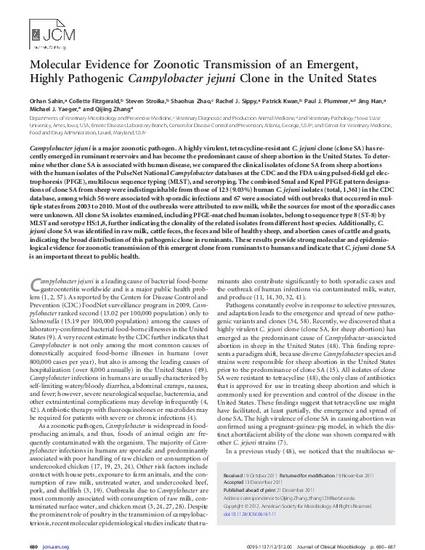
Campylobacter jejuni is a major zoonotic pathogen. A highly virulent, tetracycline-resistant C. jejuni clone (clone SA) has recently emerged in ruminant reservoirs and has become the predominant cause of sheep abortion in the United States. To determine whether clone SA is associated with human disease, we compared the clinical isolates of clone SA from sheep abortions with the human isolates of the PulseNet National Campylobacter databases at the CDC and the FDA using pulsed-field gel electrophoresis (PFGE), multilocus sequence typing (MLST), and serotyping. The combined SmaI and KpnI PFGE pattern designations of clone SA from sheep were indistinguishable from those of 123 (9.03%) human C. jejuniisolates (total, 1,361) in the CDC database, among which 56 were associated with sporadic infections and 67 were associated with outbreaks that occurred in multiple states from 2003 to 2010. Most of the outbreaks were attributed to raw milk, while the sources for most of the sporadic cases were unknown. All clone SA isolates examined, including PFGE-matched human isolates, belong to sequence type 8 (ST-8) by MLST and serotype HS:1,8, further indicating the clonality of the related isolates from different host species. Additionally, C. jejuni clone SA was identified in raw milk, cattle feces, the feces and bile of healthy sheep, and abortion cases of cattle and goats, indicating the broad distribution of this pathogenic clone in ruminants. These results provide strong molecular and epidemiological evidence for zoonotic transmission of this emergent clone from ruminants to humans and indicate that C. jejuni clone SA is an important threat to public health.
Available at: http://works.bepress.com/paul-plummer/10/

This article is from Journal of Clinical Microbiology 50 (2012): 680, doi:10.1128/JCM.06167-11.